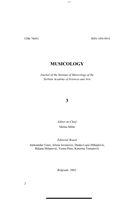Italian Musicians in Greece During the Nineteenth Century
Italian Musicians in Greece During the Nineteenth Century
Author(s): Aikaterini RomanouSubject(s): Cultural history, Music, 19th Century, Sociology of Art, History of Art
Published by: Muzikološki institut SANU
Keywords: Greek music; Italian music; music education;
Summary/Abstract: In Greece, the monophonic chant of the Orthodox church and its neumatic notation have been transmitted as a popular tradition up to the first decades of the 20th century. The transformation of Greek musical tradition to a Western type of urban culture and the introduction of harmony, staff notation and western instruments and performance practices in the country, began in the 19th century. Italian musicians played a central role in that process. A large number of them lived and worked on the Ionian Islands. Those Italian musicians have left a considerable number of transcriptions and original compositions. Quite a different cultural background existed in Athens. Education was in most cases connected to the church + the institution that during the four centuries of Turkish occupation kept Greeks united and nationally conscious. The neumatic notation was used for all music sung by the people, music of both western and eastern origin. The assimilation of staff notation and harmony was accelerated in the last quarter of the 19th century. At the beginning of the 20th century in Athens a violent cultural clash was provoked by the reformers of music education, all of them belonging to German culture. The clash ended with the displacement of the Italian and Greek musicians from the Ionian Islands working at the time in Athens, and the defamation of their fundamental work in music education.
Journal: Muzikologija
- Issue Year: 1/2003
- Issue No: 3
- Page Range: 43-55
- Page Count: 13
- Language: English

